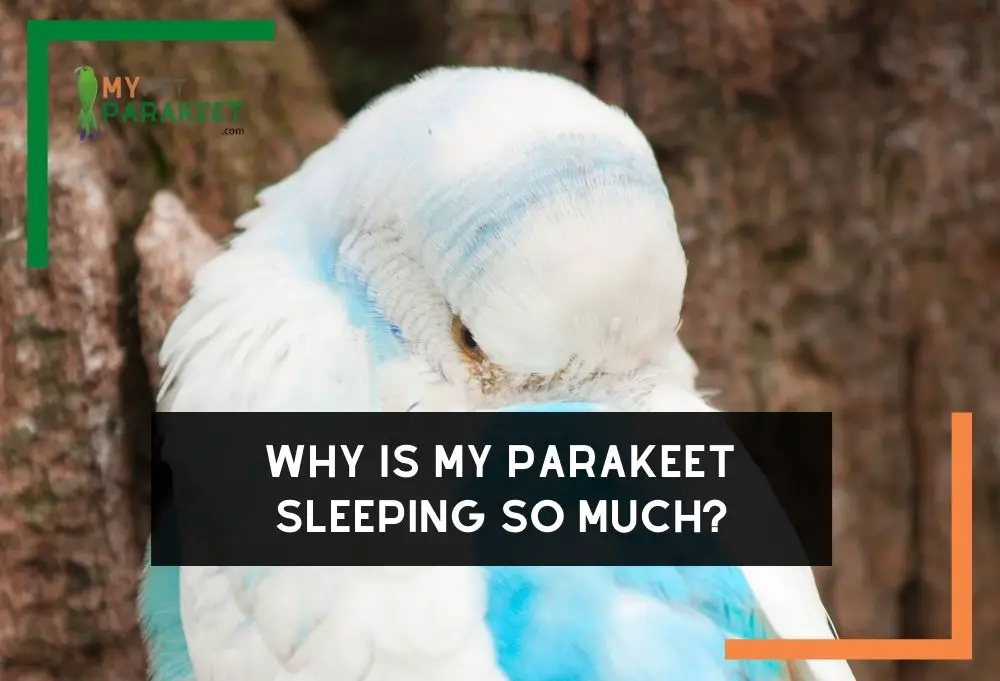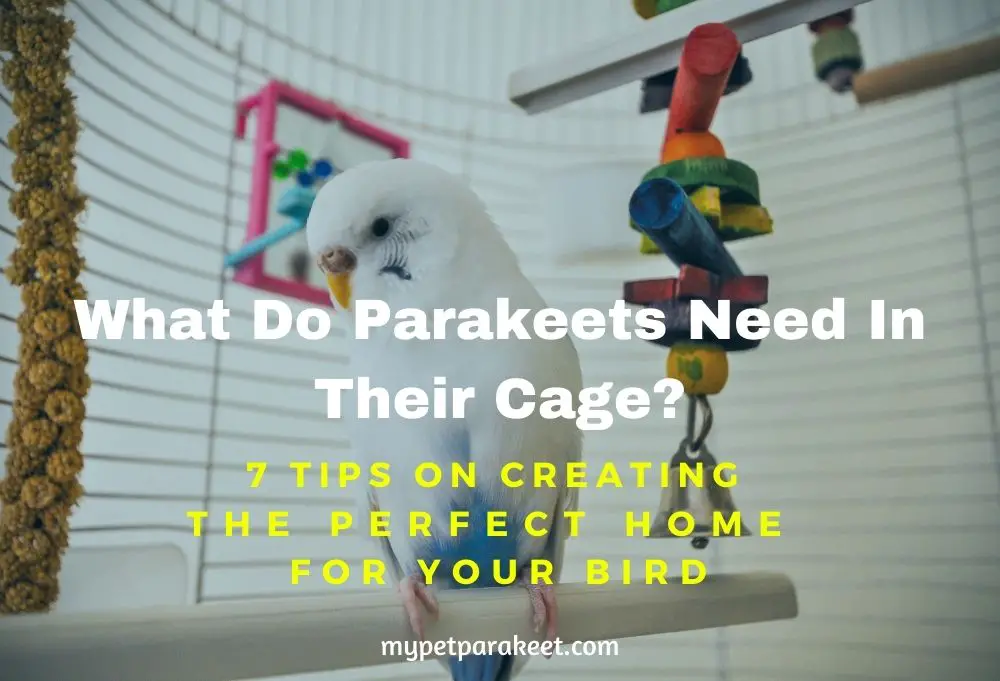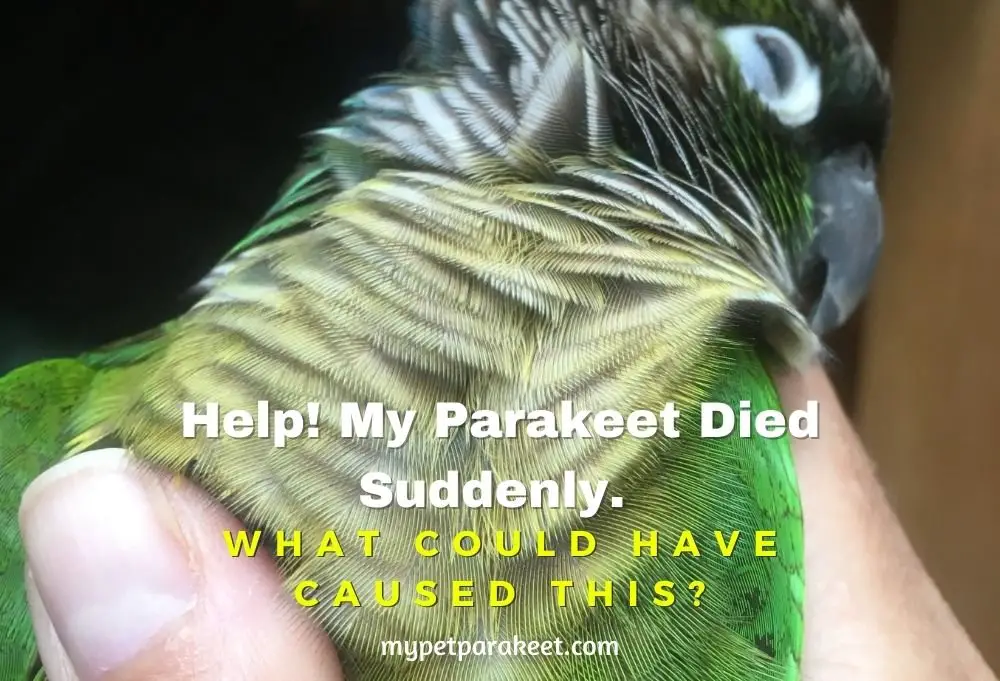Bird owners can get a big surprise when they arise to find their parakeet has laid an egg, and it is laying on the bottom of the cage!
This can be exciting if you are trying to breed your parakeets or if you initially didn’t know the sex of your bird – now you do! Much cheaper than a DNA feather test, right?
If your parakeet laid an egg on the cage floor, what should you do?
First of all, don’t panic. Egg laying is a very common and very natural behavior. It actually signifies your parakeet is in good physical health.
In this article, we will discuss the reasons for eggs being laid on the cage floor and what to do about it! We will also go over checking the fertility of an egg, the risk of excess egg-laying, and how to avoid chronic egg-laying.
Why Do Parakeets Lay Eggs On The Ground?
The floor in your parakeet’s cage is definitely a strange place to be finding an egg. Why didn’t your bird lay its egg in a nest?
No Nesting Box
It goes without saying that the most natural place for a parakeet to lay an egg would be in a nest! Your parakeet may lay on the floor if you have not provided it with a place to nest.
If your parakeet starts laying eggs, then it is experiencing breeding hormones and will want to spend its time nesting. Provide a nesting box and suitable nesting material such as pine shavings, and you may find the next egg ends up here.
Pick the egg up off the cage floor and place it in the nest if you like.
Uncomfortable Nest
If you have provided a nest and your parakeet is still laying in strange places, it may not like the nest.
Ensure the nest is quiet and dark. Too much noise or other birds bothering your parakeet might annoy it out of the nest.
If there are multiple females, they may fight over nesting areas. Provide separate spaces for each female.
Fallen Egg
Your parakeet may have laid in its nest only for the egg to fall or roll out! Ensure the nest is secure enough for eggs to stay put.
Parakeets are incredibly intuitive, and if they suspect something is wrong with the egg, they may kick it out of the nest themselves.
How To Tell If A Parakeet Egg Is Fertile?
If you have a female parakeet housed alone or with other females, then you won’t need to worry about the eggs being fertile and any potential babies.
If you have a male paired with your female, the egg may be fertile, and if incubated, it may well hatch a wee baby parakeet.
Whether you want to hatch young or not, you may want to check if the eggs are fertile. You can do this by egg candling.
Egg Candling
Basic egg candling is pretty simple to do, and you don’t need any fancy tools. All you need is a torch (your phone torch will do!) and a dark room.
Place yourself in a dark room and place the egg directly on the light, so it shines through the egg.
If the egg is older than five days old and fertile, you will see a small spot with veins coming out of it on the inner membrane of the egg, signaling the beginning of development.
If the egg is younger than five days or infertile, the light will shine right through, and nothing will be seen.
Watch this video for a visual guide.
Can A Parakeet Lay Too Many Eggs?
Some parakeets are dead-set on trying to have babies that lay egg, after egg, after egg!
A parakeet that lays too many eggs can actually become quite unhealthy. This problem is called chronic egg laying.
Laying an egg uses a great deal of energy and effort, laying a whole heap of them can deplete bodily resources and result in malnutrition.
Egg-laying particularly uses a lot of calcium which is needed to absorb other nutrients in the body. If your parakeet is laying eggs supplement calcium in their diet to keep them in good condition. Mixing electrolytes in their water will also help.
Excessive egg laying can also have a negative effect on the reproductive system of a parakeet. Too many eggs may result in “egg-binding”, where eggs get stuck in the oviduct or cloaca; this may be fatal!
How Can I Stop My Parakeet From Laying Eggs?
If you are concerned your parakeet is laying too many eggs, which you don’t intend to hatch, then there are a few things you can do to control this and keep her healthy.
Egg Pining
If you continue to remove eggs, it will just encourage your parakeet to lay more. You can let her keep her eggs without them hatching if you pin them.
Pining involves poking a small, fine need through the end of the shell and piercing the inner membrane, and stopping anything from developing inside the egg.
You can then put the egg back and let her sit on it.
Only pin eggs that are in the very early stages of development.
Using Dummy Eggs
Some parakeets are clever and quickly kick out pined eggs because they realize something is wrong. In this case, you can try to use dummy eggs.
This involves taking the real eggs and replacing them with fake ones of the same shape, size, and weight. Your parakeet will stop laying to sit on the eggs.
Using A “Night-Cage”
If none of the above tactics works to try and stop your determined parakeet from laying eggs, then you might have to snap her out of breeding mode.
One way to do this is to use a night cage. This is a small cage with only a place to perch and sleep and some water. Keep her in here at night, and she will not be able to nest or interact with other birds, and it may help her hormones to slow down.
Good Husbandry For Breeding Parakeets
- Minimize handling – your parakeet may be sexually stimulated by you touching her and speaking to her. Spend less time with her for a bit, and she may stop trying to breed.
- Don’t feed warm or soft foods – these kinds of foods resemble the food mates regurgitate to each other when breeding and can stimulate breeding behaviors in the body.
Conclusion
If your parakeet lays an egg on the cage floor, it’s not a big deal. You can pick it up and place it in a nest for her to sit on.
Be careful not to remove too many eggs as it can stimulate her to keep laying more, and chronic egg laying can create health issues. Use our guide above to keep your breeding parakeet happy!











